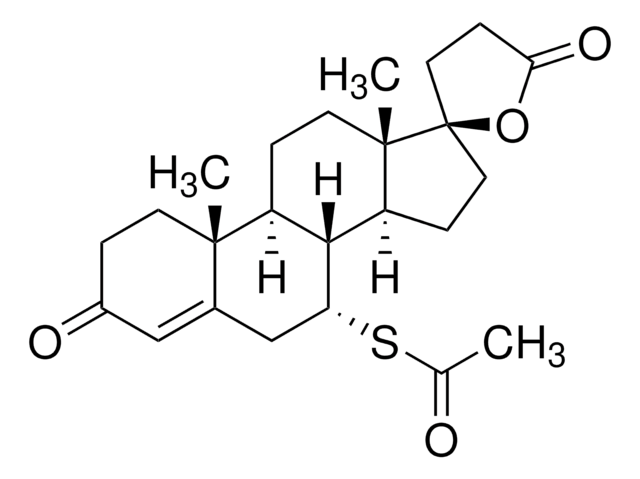P2700000
Prednisolone
European Pharmacopoeia (EP) Reference Standard
Synonym(s):
1,4-Pregnadiene-11β,17α,21-triol-3,20-dione, 1-Dehydrocortisol, 1-Dehydrohydrocortisone, 11β,17α,21-Trihydroxy-1,4-pregnadiene-3,20-dione
About This Item
Recommended Products
grade
pharmaceutical primary standard
API family
prednisolone
manufacturer/tradename
EDQM
mp
240 °C (dec.) (lit.)
application(s)
pharmaceutical (small molecule)
format
neat
SMILES string
O=C1C=C[C@@]2(C)C(CC[C@]3([H])[C@]2([H])[C@@H](O)C[C@@]4(C)[C@@]3([H])CC[C@]4(O)C(CO)=O)=C1
InChI
1S/C21H28O5/c1-19-7-5-13(23)9-12(19)3-4-14-15-6-8-21(26,17(25)11-22)20(15,2)10-16(24)18(14)19/h5,7,9,14-16,18,22,24,26H,3-4,6,8,10-11H2,1-2H3/t14-,15-,16-,18+,19-,20-,21-/m0/s1
InChI key
OIGNJSKKLXVSLS-VWUMJDOOSA-N
Gene Information
human ... NR3C1(2908)
Looking for similar products? Visit Product Comparison Guide
General description
Application
Packaging
Other Notes
related product
Signal Word
Danger
Hazard Statements
Precautionary Statements
Hazard Classifications
Repr. 1B
Storage Class Code
6.1C - Combustible acute toxic Cat.3 / toxic compounds or compounds which causing chronic effects
WGK
WGK 2
Choose from one of the most recent versions:
Certificates of Analysis (COA)
It looks like we've run into a problem, but you can still download Certificates of Analysis from our Documents section.
If you need assistance, please contact Customer Support.
Already Own This Product?
Find documentation for the products that you have recently purchased in the Document Library.
Customers Also Viewed
Protocols
Separation of Prednisolone, pharmaceutical secondary standard; traceable to USP, PhEur and BP
Our team of scientists has experience in all areas of research including Life Science, Material Science, Chemical Synthesis, Chromatography, Analytical and many others.
Contact Technical Service






